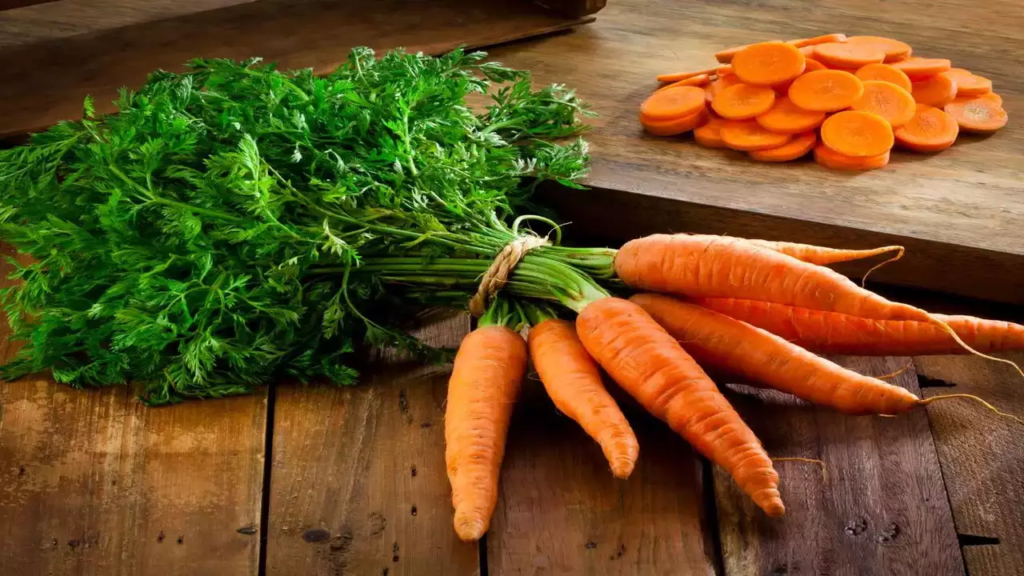1. Carrots
Carrots are a winter staple that pack a powerful immunity-boosting punch. Rich in beta-carotene, which the body converts to vitamin A, carrots help maintain the health of our skin and mucous membranes—our first line of defense against pathogens. Vitamin A also supports vision and the health of our respiratory tract.
- How to Enjoy: Carrots can be roasted, added to stews, or enjoyed raw with a healthy dip. For an extra immunity boost, try them in a warming ginger-carrot soup.

2. Kale
Known as a superfood, kale is loaded with vitamins A, C, and K. Vitamin C is essential for immune health, while vitamin A promotes skin health and boosts immunity. Kale also provides fiber, which supports a healthy gut microbiome, an essential part of our immune system.
- How to Enjoy: Use kale in hearty winter salads, blend it in smoothies, or sauté it with garlic and olive oil for a simple, nutritious side dish.
3. Broccoli
Broccoli is a powerhouse vegetable, loaded with immune-supporting nutrients like vitamin C, fiber, and antioxidants. This cruciferous veggie also contains sulforaphane, a compound that has been shown to have potential immune-boosting and anti-inflammatory effects.
- How to Enjoy: Steam or lightly sauté broccoli to retain its nutrients, or add it to a winter stir-fry for an immune-supporting meal.
4. Brussels Sprouts
Another cruciferous vegetable, Brussels sprouts are packed with vitamin C and fiber. Vitamin C is essential for the production of white blood cells, which fight off infections, and the fiber in Brussels sprouts supports gut health, which is closely tied to immune function.
- How to Enjoy: Try roasting Brussels sprouts with a drizzle of olive oil, salt, and pepper for a flavorful side dish or add them to winter vegetable bowls.
5. Spinach
Spinach is rich in iron, vitamin C, and beta-carotene, all of which are essential for maintaining strong immunity. Its high levels of antioxidants also help protect cells from damage, while folate supports the production of new cells.
- How to Enjoy: Add fresh spinach to salads, soups, or stir-fries. It’s also a great ingredient to mix into a morning smoothie.
6. Sweet Potatoes
Sweet potatoes are another beta-carotene-rich veggie that supports immune health. They also contain vitamin B6 and potassium, which help keep your body’s nervous and immune systems in balance.
- How to Enjoy: Roast sweet potatoes with a sprinkle of cinnamon or mash them for a comforting winter side dish.
7. Beets
Beets are known for their unique blend of immune-boosting antioxidants, as well as folate, fiber, and vitamins A and C. Their vibrant color is due to betalains, which have antioxidant and anti-inflammatory properties.
- How to Enjoy: Roasted beets make a colorful addition to winter salads or can be blended into smoothies for a nutrient-rich boost.
8. Cabbage
Cabbage is high in vitamins C and K, along with fiber and various antioxidants that help strengthen the immune system. It also contains glucosinolates, compounds with potential antiviral and antibacterial properties.
- How to Enjoy: Add cabbage to soups, use it in stir-fries, or try making homemade sauerkraut, which provides gut-friendly probiotics.
9. Cauliflower
Cauliflower is rich in vitamin C, folate, and choline, a nutrient that helps keep cells functioning properly. It’s also loaded with antioxidants that help protect the immune system.
- How to Enjoy: Try roasting cauliflower with turmeric for added anti-inflammatory benefits or use it as a base for soups and stews.
10. Leeks
Leeks, a close relative of garlic and onions, are high in vitamins A, C, and K. They also contain allicin, a compound known for its antibacterial and antiviral properties, which can help ward off seasonal infections.
- How to Enjoy: Leeks add a mild, sweet flavor to soups and stews. You can also sauté them as a base for savory dishes or add them to a creamy winter soup.
Boost Your Immunity, One Bite at a Time
Incorporating these winter vegetables into your diet is a delicious and natural way to support your immune system during the colder months. Not only do they offer vital nutrients, but they also bring variety and flavor to your winter meals. This season, make it a point to fill your plate with these nutrient-rich vegetables to help keep illness at bay and stay energized.
4o